Alpha Arbutin For Skin: Benefits, How To Use, And Side Effects
This rich compound will work wonders in clearing and nourishing your complexion!
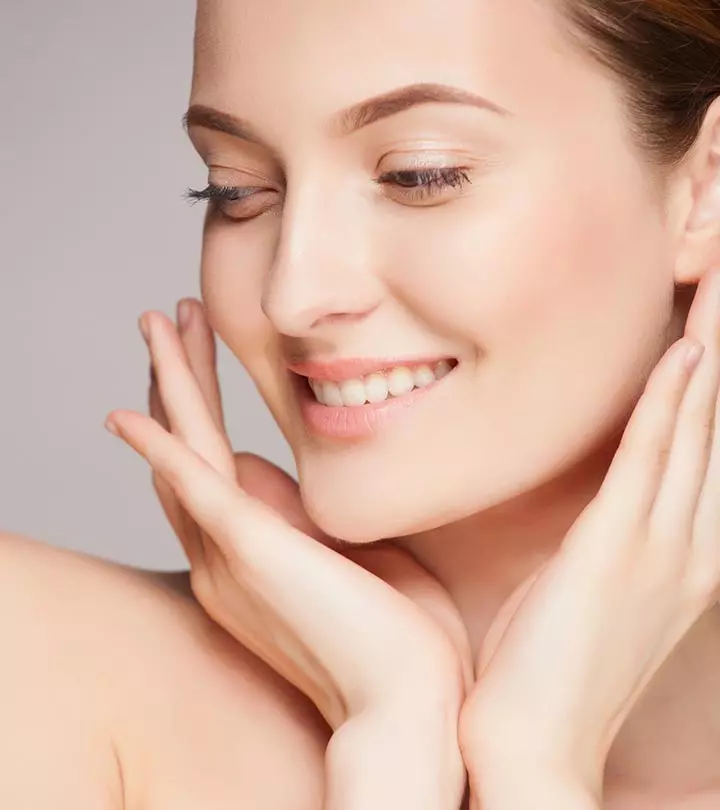
Image: Shutterstock
Uneven skin tone and dark spots are two of the most common skin problems. Yet, while numerous treatments and substances promise to brighten the skin, most people have never heard of alpha arbutin. So, what exactly is alpha arbutin for skin? It is one of the most popular skin-brightening agents in the world currently (1). Moreover, alpha arbutin serum benefits your skin and performs better than even the most popular skin care ingredients such as vitamin C, kojic acid, and licorice at brightening the skin (1), (2).
Many skin care solutions guarantee to brighten the skin tone, but they may be extremely drying or cause skin irritation. That is why arbutin has popped up as the best remedy for a variety of skin care issues and can work wonders if you include it in your skincare routine. In this article, we will debunk the myths surrounding this incredibly well-known component so you can get the benefits of its versatile skin care properties!
 Know Your Ingredient: Alpha Arbutin
Know Your Ingredient: Alpha ArbutinPregnant or lactating women, people with damaged skin, and those allergic to arbutin should avoid using it.
In This Article
What Is Arbutin?
Arbutin is a naturally occurring skin-brightening agent that is found in various plant species such as marjoram, cranberry, blueberry, and several pear species.
Alpha arbutin is simply the chemically synthesized version that is actively used in multiple skin care products. Alpha arbutin inhibits the production of melanin (the pigment responsible for your skin color), making it an excellent skin brightener (1).
There are two forms for arbutin – alpha arbutin (biosynthesized by microorganisms) and beta arbutin (extracted from the leaves of various plants and fruit peels). According to research, alpha arbutin is 10x more efficient in inhibiting tyrosinase activity than natural ingredients of arbutin (1).
Next, let us look at how alphas arbutin works its wonders on the skin.
Key Takeaways
- Alpha arbutin can help brighten skin and reduce dark spots.
- It seems to work better than vitamin C and kojic acid.
- It also may reduce acne scars and even out one’s skin tone.
- However, those allergic to alpha arbutin may experience some side effects.
How Does Alpha Arbutin Work On The Skin?
Arbutin is often compared to other gentler brighteners like kojic acid (derived from mushrooms) and licorice root (derived from the licorice plant), but it is much more effective than these ingredients (1). It is a derivative of hydroquinone, which is considered to be one of the most powerful skin-lightening and spot-fading ingredients out there. Here is how alpha-arbutin works on the skin:
Step 1: Brown spots emerge from pigments that are produced in cells called melanocytes. These cells contain an enzyme called tyrosinase.
Step 2: These cells can get activated as soon as the skin comes in contact with UV light. This is why people get freckles and sunspots if they are exposed to the sun for too long.
Step 3: Alpha arbutin slowly releases hydroquinone over time, thus inhibiting tyrosinase – the enzyme that is responsible for the production of melanin in the skin.
It is interesting to note that the skin is not exposed to excessive amounts of hydroquinone at a time. This ensures that there are no side effects of hydroquinone for skin, the common ones being darkening of the skin tissue as well as irritation. Also, the product effectively stops the extra production of melanin as well as blocks the production of tyrosinase. As you can imagine, this ultimately reduces the degree of skin darkening and keeps the dark spots at bay without any harmful side effects.
Moving on, it is time to look at alpha arbutin’s benefits for skin.
What Are The Skin Benefits Of Alpha Arbutin?
1. Lightens Dark Spots
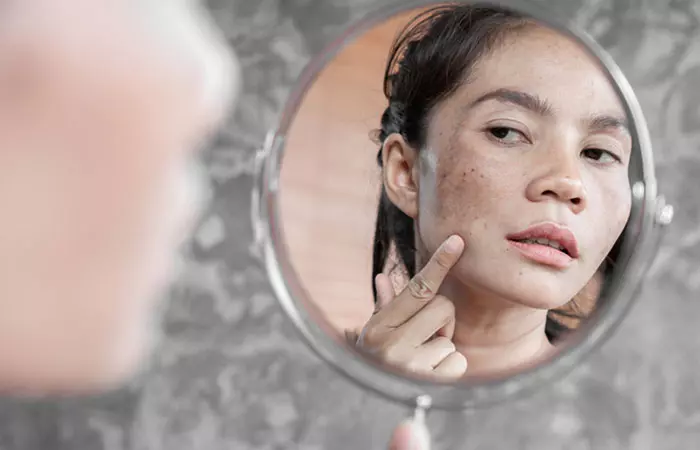
Alpha arbutin lightens the skin tone and makes it look healthy and radiant by fading discoloration caused by inflammation and environmental stress. This includes sunspots, age spots, acne scars, and melasma (3). It acts as a natural blending foundation for the skin.
2. Reduces The Appearance Of Acne Scars
Alpha arbutin is said to work well when it comes to fading the red-purple acne scars caused by acne. However, there is no scientific evidence to prove the same.
3. Helps Even Out The Skin Tone
Alpha arbutin helps improve an uneven complexion by inhibiting the production of tyrosinase. This, in turn, fades hyperpigmentation. This eventually leads to a more even skin tone (2). It also addresses sugar-induced skin sallowness (yellowness) and loss of elasticity (1)
4. Prevents Hyperpigmentation And Discoloration
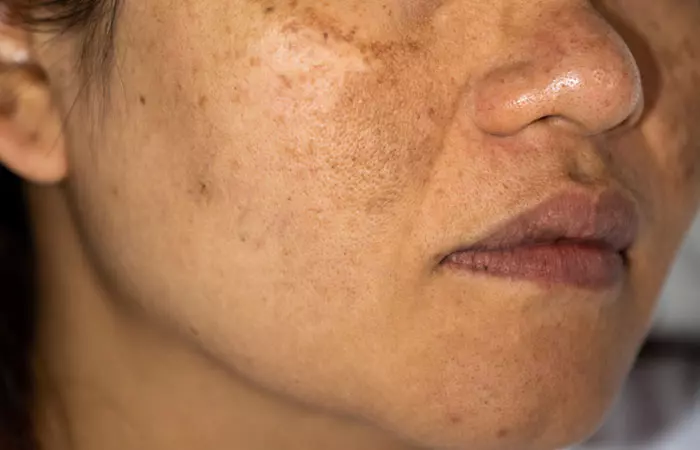
Alpha arbutin can successfully inhibit melanin synthesis, making it effective and safe for those looking into hyperpigmentation issues. Simultaneously, you may also explore how to treat hyperpigmentation to get some ideas to reduce hyperpigmentation to get a clear and clean skin. It protects the skin from sun-induced pigmentation and free radicals without increasing the skin’s sensitivity to sun exposure (1). In fact, it may prevent future freckles and hyperpigmentation from developing, after sunburn, by stopping extra production of melanin. In other words, less melanin equals less pigment. This leads to reduced dark spots and an even complexion. However, further research is required to understand this mechanism.
If you are wondering about who should use alpha arbutin, keep reading.
Who Should Consider Using Alpha Arbutin?
Generally, arbutin is considered safe for all skin types. It is particularly good for darker skin, which is more prone to hyperpigmentation as it has higher amounts of melanin. Additionally, if you are looking to treat hyperpigmentation caused by sun exposure, acne scarring, or melasma, or want to even out blotchy skin tone, this should be your go-to product.
It is also safe for sensitive skin as the active component in arbutin is released slowly. Furthermore, as compared to other more aggressive ingredients, such as acids and peels (which can cause irritation and dryness), alpha arbutin is considered a safer alternative. It causes less irritation than hydroquinone – an ingredient that is banned in Japan and Europe – making it safe to use (1), (4). In fact, the FDA has branded hydroquinone as carcinogenic when taken orally (5).
 Did You Know?
Did You Know?This ingredient can only work effectively when used correctly. Read on to understand the correct dosage and application of alpha arbutin.
How Should You Use Alpha Arbutin?
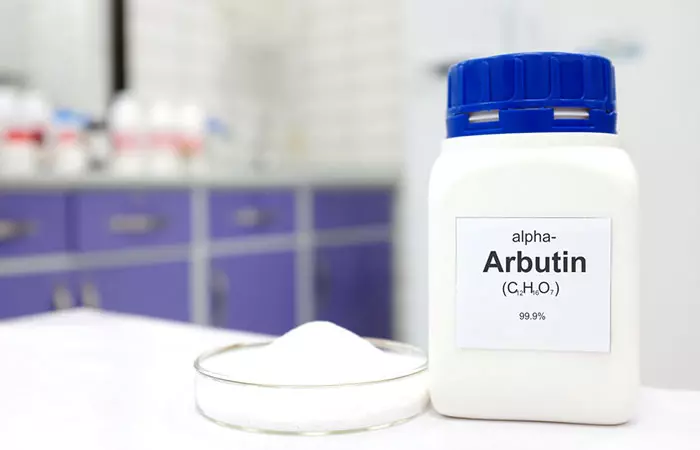
Alpha arbutin is found as the main ingredient in a wide range of skin-lightening beauty products, such as creams, serums, face washes, gels, and lotions. It is one of the most widely used ingredients in overnight masks and water creams. Here are a few best things to consider when using alpha arbutin:
- Considering that it is safe to use even for sensitive skin, it can be used twice a day – once in the morning and once at night. However, make sure to do a patch test prior to trying it to avoid the risk of unknown allergies/irritation.
- You can apply it on clean, dry skin after cleansing and toning but before you use any heavy moisturizers and sunscreens. Make sure to wait for the arbutin product to fully dry prior to applying moisturizer. Otherwise, the product will not effectively sink into your skin.
- Depending on your skin concern, you can use it directly on the hyperpigmented areas on the face as a spot treatment or on your entire face (avoiding the eyes, lips, and mouth).
- Remember that you can use it in combination with other skin-lightening ingredients, such as chemical peels and retinol, as well as with other creams and serums that contain vitamin C and AHAs to maximize its efficacy.
- It can be used in the summers as it does not make the skin more sensitive to the sun – which is a concern with most skin-lightening products.
- In terms of dosage, alpha arbutin is safe for topical use in concentrations of up to 2%. On the other hand, beta arbutin is safe for topical use in concentrations of up to 7% in skin care products (6). Make sure to not use these ingredients for more than 90 days at a stretch. Consult a dermatologist to understand the ideal dosage and frequency based on your skin type, underlying issues, skin sensitivity, etc.
In the next section, we will look at the side effects and precautionary measures to keep in mind when using arbutin.
Possible Side Effects To Keep In Mind
While there are no known negative interactions with other skin care ingredients, heat can degrade the effectiveness of arbutin (7). So, keep it away from sunlight and hot areas, and make sure to store it in a cool and dry place at all times (like in your bedside drawer).
If you are allergic to alpha arbutin, you may experience the following side effects:
- Skin irritation
- Mild acne
- Sun-sensitivity or sunburn
- Redness or irritation
 Quick Tip
Quick TipIn the final section, we will outline the top safety tips you should follow while using arbutin in any form.
Top 6 Safety Tips For Alpha Arbutin
- Always follow up with a moisturizer and sunscreen after using arbutin. But, make sure to wait till the arbutin product seeps into the skin before applying other products.

- Speak to your dermatologist before you buy any skin care product containing arbutin to understand the right arbutin concentration for you.
- You might be allergic to arbutin, so make sure to do a patch test on a small area on your forearm. If you experience redness or irritation, stop using the product immediately. If there is no irritation within 24 hours, you can use the product on your face.
- Do not use the product for more than 3 months at a time as you risk damaging your skin.
- Do not use arbutin in any form on damaged or broken skin.
- Do not use arbutin if you are pregnant or lactating as there is not enough research supporting its safety while using during pregnancy.
Another acid that has recently become popular is tranexamic acid for skin. Let us understand in the following section how it compares with alpha arbutin in promoting skin health.
Alpha Arbutin Vs. Tranexamic Acid
While both acids are known for treating hyperpigmentation, dark spots, and acne scars, tranexamic acid is said to be more effective in achieving even-toned, clear skin. Anecdotal evidence also suggests that tranexamic acid exhibits sun-shielding properties and can diminish the appearance of sunspots and prevent skin discoloration. While both the acids help treat these common skin woes, you can select the one that is most suitable for you. For instance, in comparison to tranexamic acid, alpha arbutin is more stable and gentle on the skin and could be suitable for those with sensitive skin.
While there are multiple skin-brightening agents making the rounds in the skin care domain, most have adverse side effects or are harmful to sensitive skin when used incorrectly. This is where alpha arbutin comes in. This skin-brightening agent is well-tolerated among all skin types and is effective in reducing the production of melanin and making your skin glow. This is why it is hailed as an effective skin-lightening agent with little to no side effects.
Infographic: Ingredients That Go Well With Alpha Arbutin
Alpha arbutin is an excellent skin brightening agent that inhibits the overproduction of melanin. This active ingredient can be found in serums, creams, and moisturizing lotions. You can also mix it with other ingredients to reduce pigmentation and enhance your skin tone.
Check out the infographic below to know more! Illustration: StyleCraze Design Team
Alpha arbutin is a skin-brightening agent used in several products to inhibit the production of melanin, resulting in skin lightening and radiant skin. Studies suggest that alpha-arbutin is more effective than other skin brighteners such as kojic acid or vitamin C. In addition to lightening dark spots, alpha arbutin reduces acne scars and improves your skin texture. You can use alpha-arbutin for your skin as a lotion, gel, or cream. While alpha-arbutin is safe and suitable for all skin types, conduct a patch test before using it.
Frequently Asked Questions
Does alpha arbutin bleach skin?
Yes, alpha arbutin bleaches the skin slightly and brightens it by reducing melanin production. If you want to learn how to bleach your skin, this is a light bleaching agent that is ideal for persons with sensitive skin because it is less irritating than other bleaching agents.
Is alpha arbutin better than retinol?
Alpha arbutin is worth trying if you have sensitive skin because it is known to be gentler than retinol. For other skin types, alpha arbutin can be safely used with retinol. The two chemicals target different skin concerns and complement each other in brightening and anti-aging routines.
Which is better Alpha Arbutin or Hyaluronic Acid?
Both these ingredients have completely different functions. While Alpha Arbutin is a depigmenting agent, hyaluronic acid acts as a humectant and emollient that traps essential moisture in your skin and improves your skin texture.
Does Alpha Arbutin cause purging?
No, Alpha Arbutin is not known to cause purging. However, it is advisable to do a patch test before applying to sensitive skin.
Is it ok to use Niacinamide and Alpha Arbutin together?
Yes, in fact, the duo makes it all the better for your skin. While Alpha Arbutin reduces pigmentation, niacinamide improves skin hydration and battles redness and inflammation.
Unveil the ultimate solution for hyperpigmentation with the power of alpha arbutin 2 combined with hyaluronic acid. Learn how to effectively incorporate it into your skincare routine and bid farewell to uneven skin tone. Watch now!
References
Articles on StyleCraze are backed by verified information from peer-reviewed and academic research papers, reputed organizations, research institutions, and medical associations to ensure accuracy and relevance. Read our editorial policy to learn more.
- Alpha Arbutin as a Skin Lightening Agent: A Review
https://www.researchgate.net/publication/350621514_Alpha_Arbutin_as_a_Skin_Lightening_Agent_A_Review - Cosmeceuticals for hyperpigmentation: What is available?
https://journals.lww.com/JCAS/pages/default.aspx - Cosmeceuticals for Hyperpigmentation: What is Available?
https://www.ncbi.nlm.nih.gov/pmc/articles/PMC3663177/ - Hydroquinone
https://www.ncbi.nlm.nih.gov/books/NBK539693/ - Position on Topical Hydroquinone
https://www.asds.net/Portals/0/PDF/asdsa/asdsa-position-statement-hydroquinone.pdf - Opinion On α-arbutin
https://ec.europa.eu/health/scientific_committees/consumer_safety/docs/sccs_o_176.pdf - Arbutin
https://pubchem.ncbi.nlm.nih.gov/compound/Arbutin
Read full bio of Dr. Harryono Judodihardjo
Read full bio of Arshiya Syeda
Read full bio of Ramona Sinha
Read full bio of Swathi E







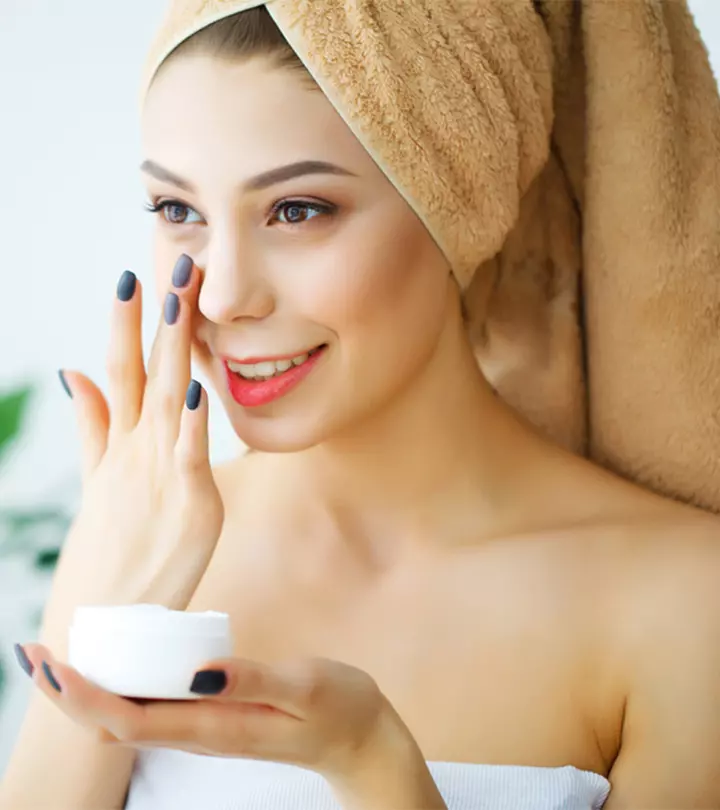


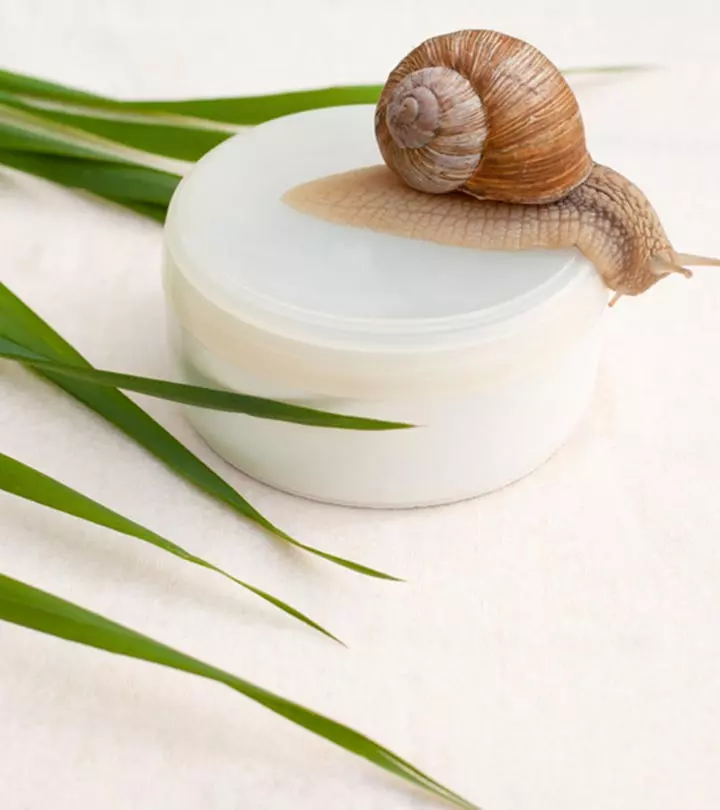
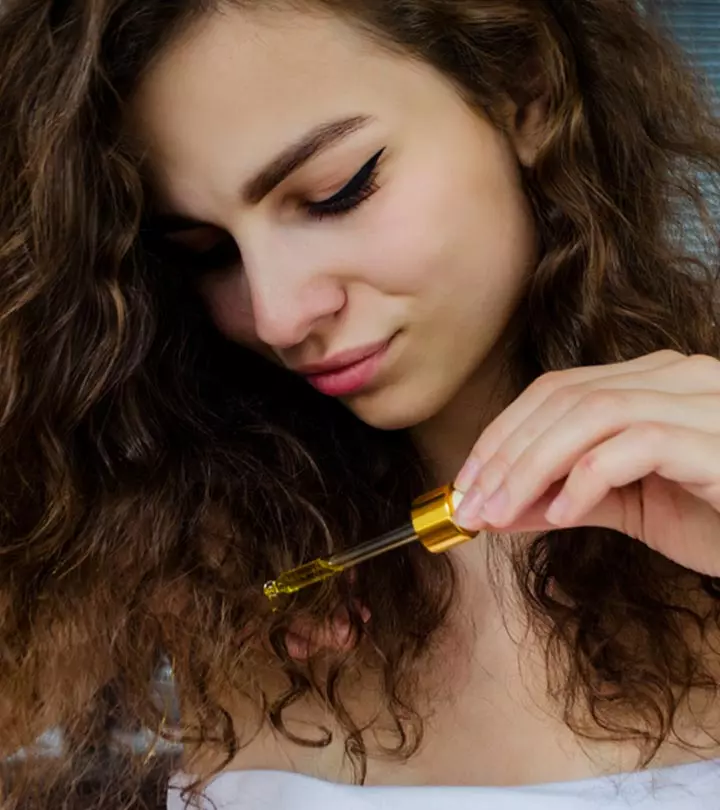
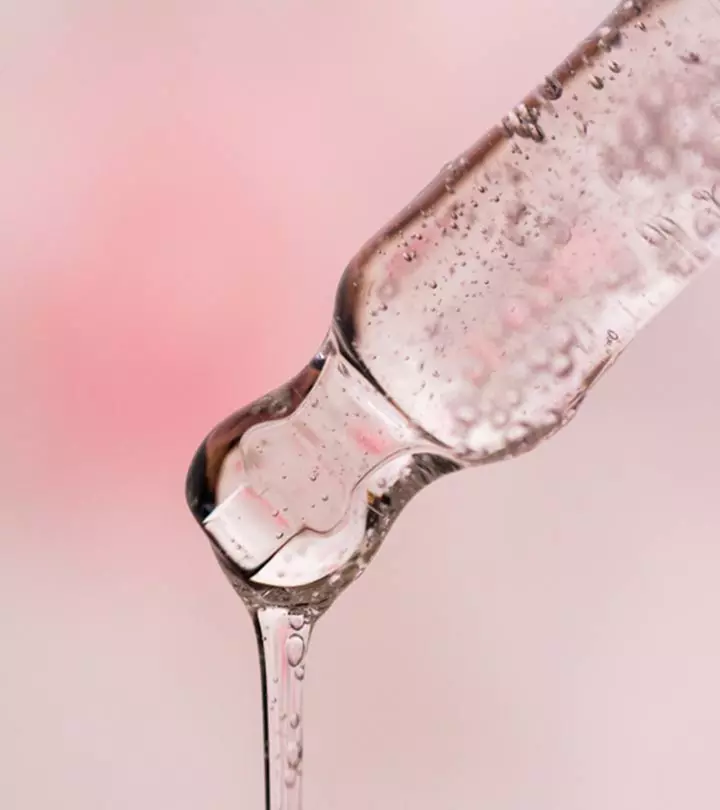
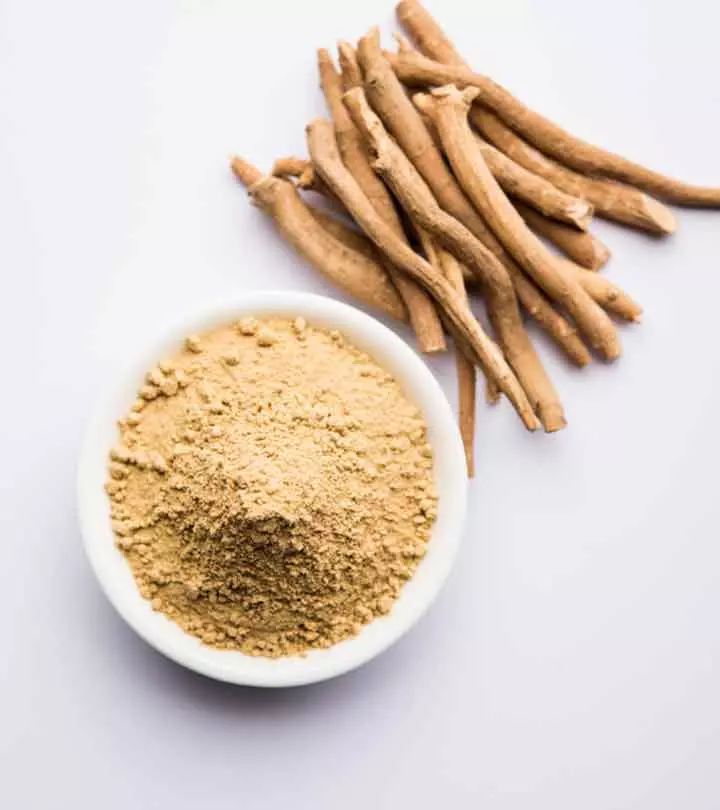
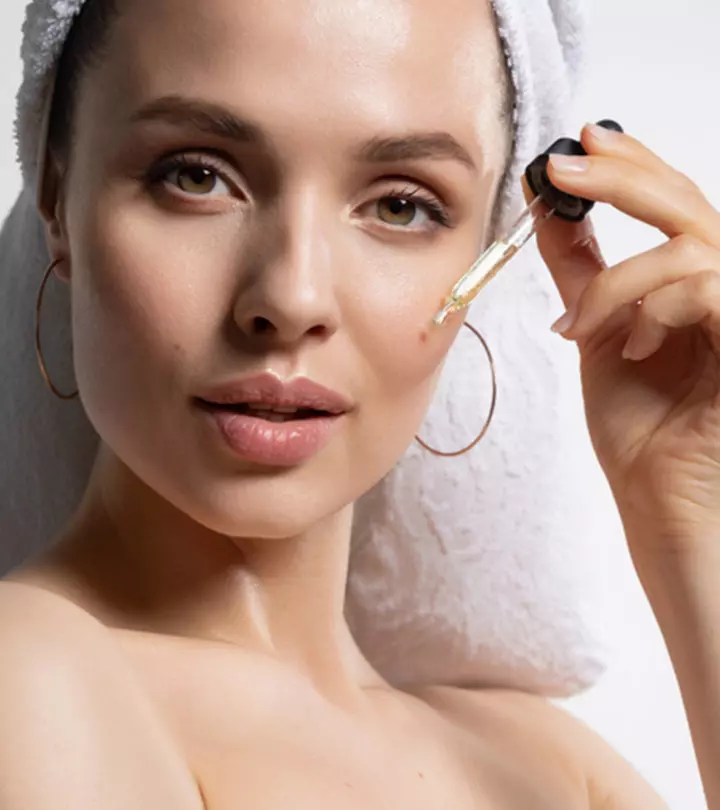
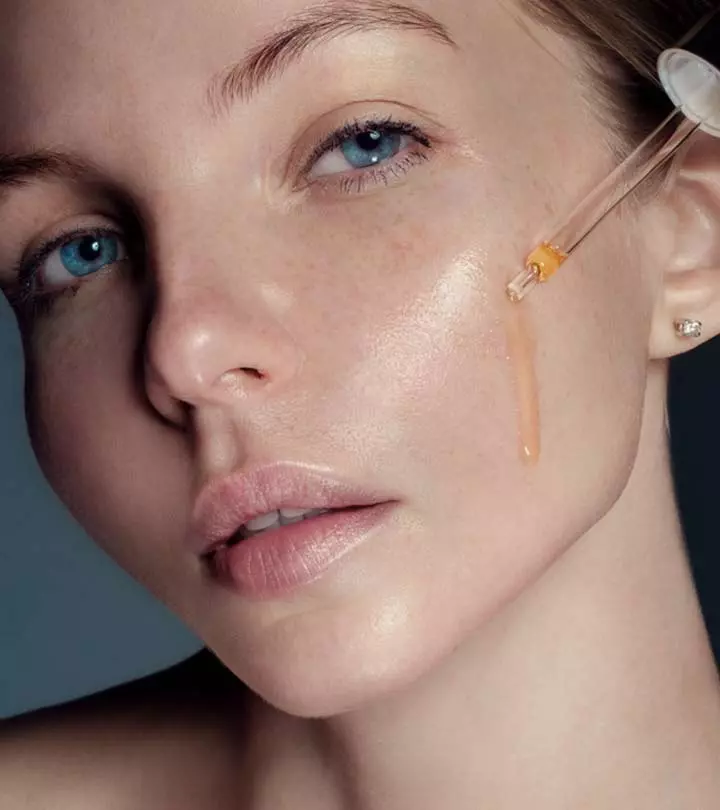



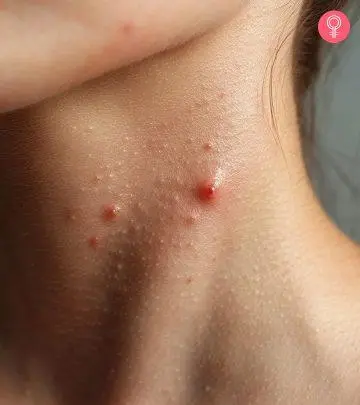
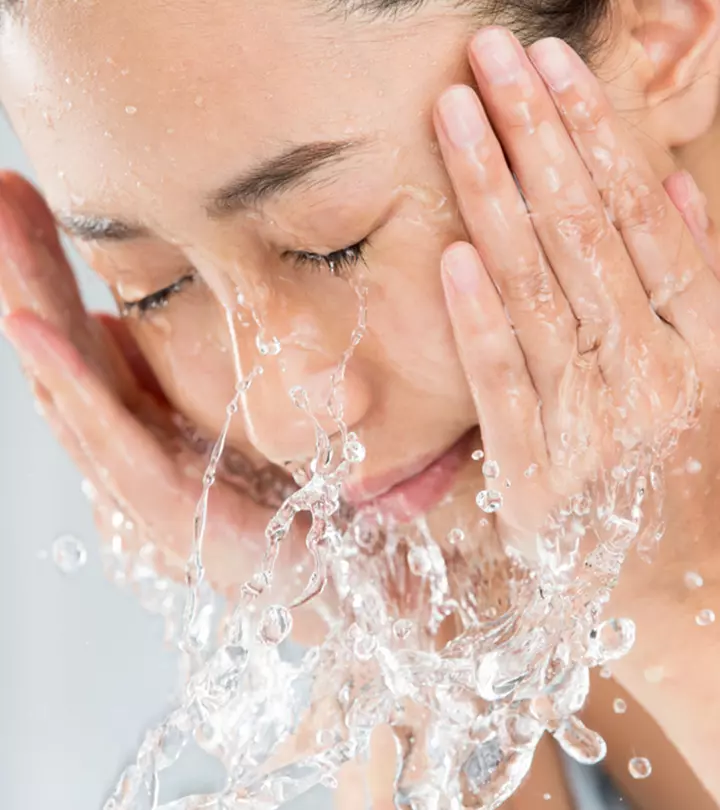
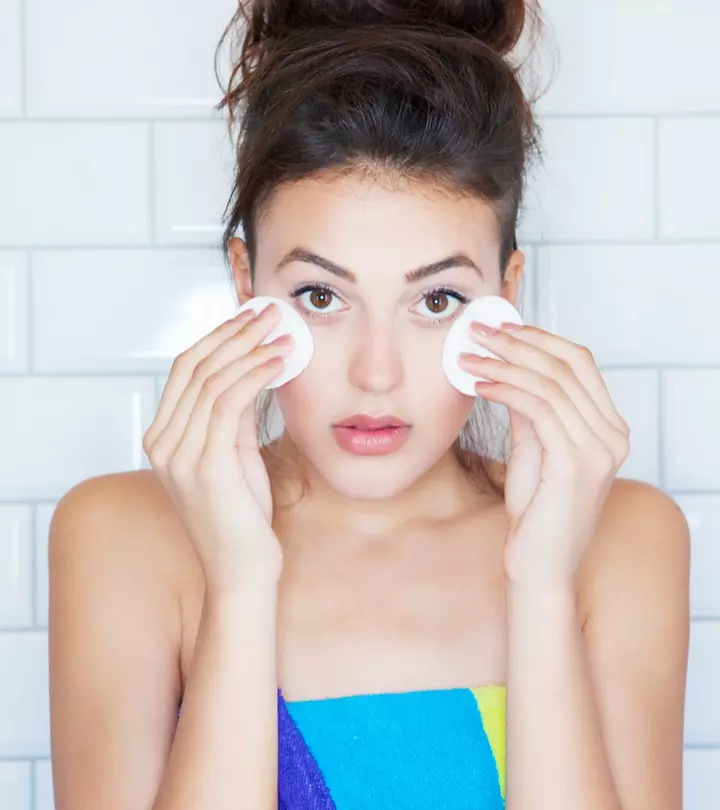
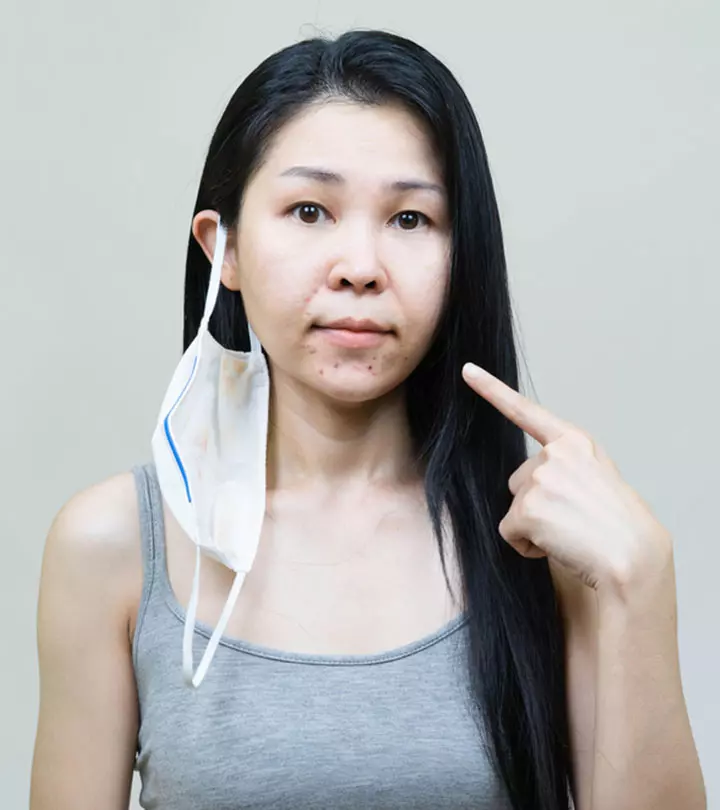
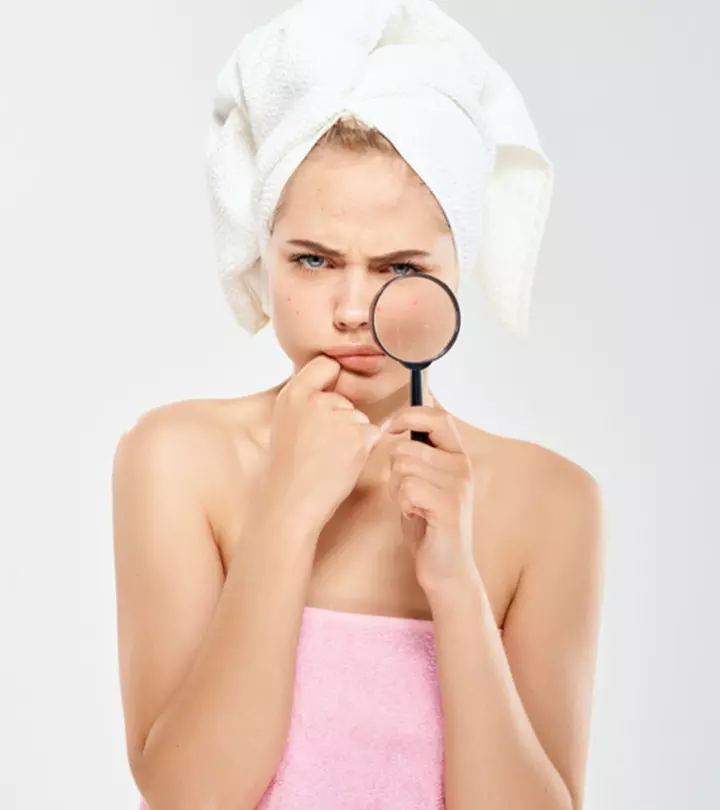
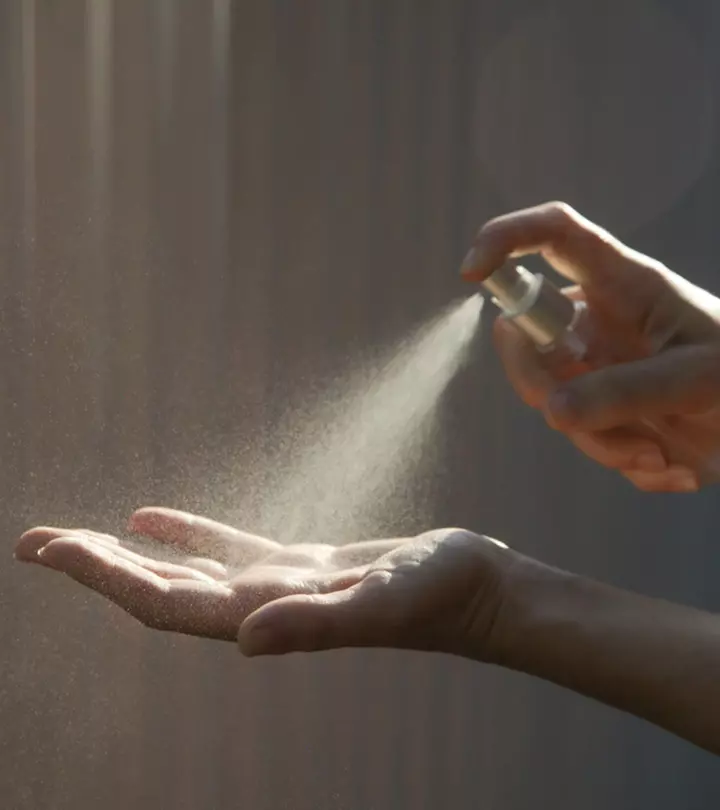

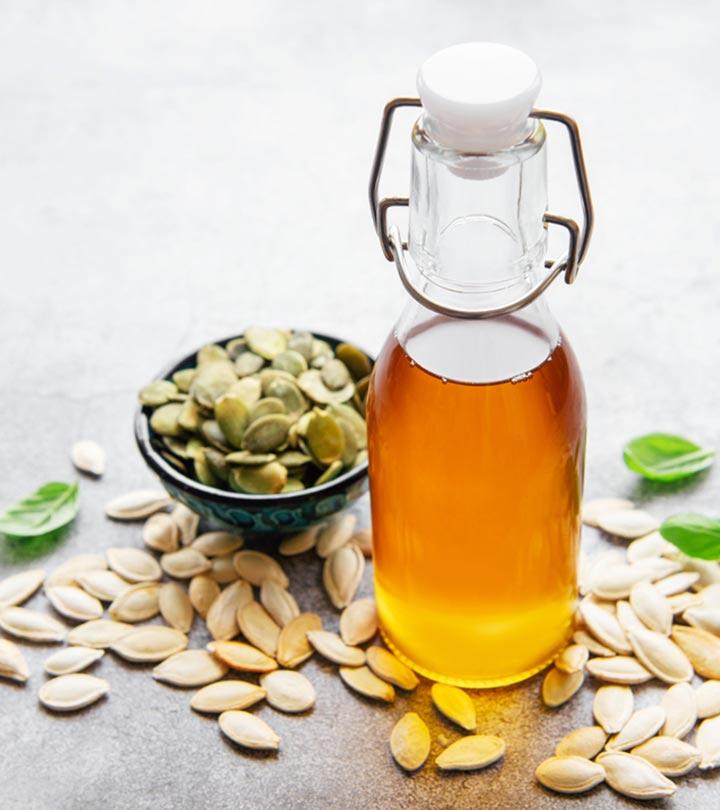

Community Experiences
Join the conversation and become a part of our empowering community! Share your stories, experiences, and insights to connect with other beauty, lifestyle, and health enthusiasts.